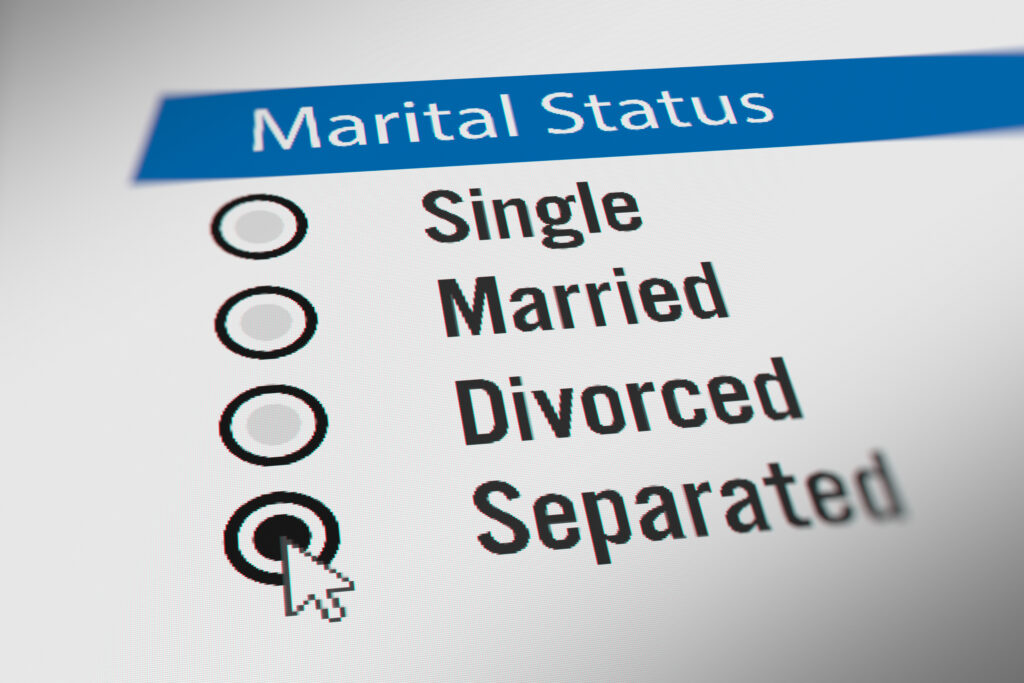Legal Separation vs. Divorce: How to Decide What is Best for You
In New York, legal separation allows couples to remain married while formally ending their economic partnership through a written agreement that addresses key issues like support, parenting, and property division. While some couples choose separation for financial or strategic reasons, others may prefer divorce for emotional closure or complete legal independence.

When your marriage is no longer working, you may be wondering whether to legally separate or move forward with divorce. Each option affects your financial and personal life differently.
In New York, legal separation and divorce require many of the same conversations and agreements, but they lead to very different outcomes. Understanding the distinctions can help you decide what path makes the most sense for your situation.
What Legal Separation Means in New York
A legal separation can be achieved in one of two ways:
- You can sue your spouse by bringing an Action for Separation against them in the courts
- You and your spouse can enter into a written agreement that addresses all the major decisions you would normally deal with in a divorce (more common)
Because an Action for Separation is so uncommon, this article will address situations where a Separation Agreement is negotiated and signed by both spouses.
The issues to be discussed and agreed upon in a Separation Agreement will include spousal support, property division, taxes, and other financial matters. If you have children, the agreement will also address parenting time, decision-making, and child support. Once the agreement is signed, you are considered legally separated. The marriage remains intact, but the economic partnership ends.
From a legal standpoint, you are no longer a spouse with inheritance rights. However, because you are still married, you may continue to share some legal and financial benefits. For many couples, this is the main reason to choose separation instead of divorce.
Why Some Couples Choose Legal Separation
Legal separation can offer certain financial advantages. For example, some couples stay legally married so one spouse can remain on the other’s health insurance plan. Others may choose to continue filing joint tax returns to pay less in taxes and preserve more of their overall income.
There may also be strategic reasons related to retirement or Social Security. If your marriage is approaching the 10-year mark and one spouse has earned significantly less, remaining legally married a bit longer could increase the lower-earning spouse’s future Social Security benefits.
Some couples choose to remain legally separated to keep health insurance through an employer-sponsored plan. After divorce, the spouse who was covered through that plan may continue the same coverage through COBRA for up to 36 months. Because COBRA coverage must be paid out-of-pocket and is often expensive, delaying divorce may give that spouse time to conserve funds following the separation, or, for older couples, it may give one spouse the time they become entitled to Medicare benefits.
When Divorce May Be the Better Option
There are times when divorce is the right step, even if it results in higher costs or fewer financial perks. If you want to remarry, you must be divorced. Some people feel strongly about having emotional closure and want the legal end of the marriage to reflect how they feel internally.
Others may not want to remain tied to their spouse through insurance or taxes, even if doing so might be financially beneficial. If you are certain that you no longer want or need to share any part of your life with your spouse, divorce is the cleanest way to move forward.
Legal Separation Is Not Just Living Apart
It is important to understand that moving out or living separately without a written agreement is not the same as a legal separation. Without a formal separation agreement, you still have the legal and financial responsibilities of a married couple. This kind of informal arrangement can leave you vulnerable, especially if something unexpected happens.
If you are considering long-term separation but want to keep the legal protections in place, a written agreement is essential. It should also anticipate what happens if one spouse later decides they want a divorce. A well-drafted separation agreement can outline how things would change in that case, including adjustments in support or insurance coverage.
Deciding What Is Best for You
There is no single right answer. Most people who sign Separation Agreements in New York choose to divorce, but that does not mean legal separation is the wrong choice. It depends on your values, your financial picture, your long-term goals, and the relationship you still have with your spouse.
At Vacca Family Law Group, we help you understand how legal separation or divorce could affect every part of your life—from your finances and family dynamics to your emotional well-being. During your free introductory call, we’ll listen to your concerns, walk you through your options, and help you identify the path forward that best aligns with your goals. Get in touch with us today to start the conversation.
Vacca Family Law Group is located at One Grand Central Place, 60 E. 42nd St., Suite 700, New York, NY 10165.
Andrea Vacca is a Collaborative Divorce Attorney and Mediator with more than 30 years of legal experience. A former President of the New York Association of Collaborative Professionals, she is a member of numerous family law and dispute resolution organizations, including the International Academy of Collaborative Professionals, the NYS Council on Divorce Mediation, and the Family and Divorce Mediation Council of Greater New York. Andrea is also the host of A Better Divorce Podcast, which offers expert insights to help individuals approach divorce with less conflict and more intention.

